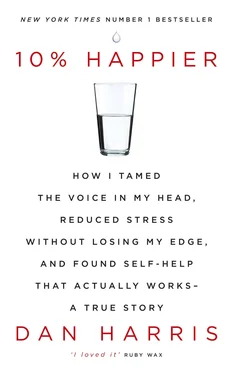Don’t Force It
It’s hard to open a jar when every muscle in your arm is tense. A slight relaxation served me well on the set of GMA , in interpersonal interactions, and when I was writing scripts. I came to see the benefits of purposeful pauses, and the embracing of ambiguity. It didn’t work every time, mind you, but it was better than my old technique of bulldozing my way to an answer.
Humility Prevents Humiliation
We’re all the stars of our own movies, but cutting back on the number of Do you know who I am? thoughts made my life infinitely smoother. When you don’t dig in your heels and let your ego get into entrenched positions from which you mount vigorous, often irrational defenses, you can navigate tricky situations in a much more agile way. For me humility was a relief, the opposite of humiliation. It sanded the edges off of the comparing mind. Of course, striking the right balance is delicate; it is possible to take this too far and become a pushover. (See precept number two, regarding hiding the Zen.)
Go Easy with the Internal Cattle Prod
As part of my “price of security” mind-set, I had long assumed that the only route to success was harsh self-criticism. However, research shows that “firm but kind” is the smarter play. People trained in self-compassion meditation are more likely to quit smoking and stick to a diet. They are better able to bounce back from missteps. All successful people fail. If you can create an inner environment where your mistakes are forgiven and flaws are candidly confronted, your resilience expands exponentially.
Nonattachment to Results
Nonattachment to results + self compassion = a supple relentlessness that is hard to match. Push hard, play to win, but don’t assume the fetal position if things don’t go your way. This, I came to believe, is what T. S. Eliot meant when he talked about learning “to care and not to care.”
What Matters Most?
One day, I was having brunch with Mark and Joseph, forcing them to help me think about the balance between ambition and equanimity for the umpteenth time. After the entrées and before dessert, Joseph got up to hit the bathroom. He came back smiling and pronounced, “I’ve figured it out. A useful mantra in those moments is ‘What matters most?’ ” At first, this struck me as somewhat generic, but as I sat with the idea for a while, it eventually emerged as the bottom-line, gut-check precept. When worrying about the future, I learned to ask myself: What do I really want? While I still loved the idea of success, I realized there was only so much suffering I was willing to endure. What I really wanted was aptly summed up during an interview I once did with Robert Schneider, the self-described “spastic” lead singer for the psych-pop group, Apples in Stereo. He was one of the happiest-seeming people I’d ever met: constantly chatting, perpetually in motion—he just radiated curiosity and enthusiasm. Toward the end of our interview, he said, “The most important thing to me is probably, like, being kind and also trying to do something awesome.”
I proudly presented my list to Bianca. Her response was to flash an impish grin and say, “But you’re not actually practicing these.” Specifically, she was referring to the first one about not being a jerk.
“This is aspirational, not operational,” I assured her.
While imperfectly applied, my precepts were having salutary effects at the office. Nine months after my initial meeting with Ben, I requested another meeting—this time to ask him a specific question related to this book. I wanted to make sure he was okay with my including old stories of drug abuse. It was the first time I was telling anyone in power about the real story behind my panic attacks. It was fascinating to watch the twitch of recognition on his face as he recalled and reevaluated the event. We discussed the pros and cons of disclosure. Ultimately, he said he would have my back, whatever I decided.
Then, unprovoked, he raised the subject of the two mantras he had created for me in our last meeting, and declared that I had, in his eyes, fully succeeded in both “upping my game” and becoming a “leading man.” For good measure, he also pointed out that while he had enjoyed a recent story I’d done for Nightline on a squad of teenage girl exorcists, he thought I could have used a cleaner shave.
As I write this, in the fall of 2013, it’s been five years since I first read Eckhart Tolle, four years since I started meditating, and more than two years since I had my pivotal meeting with Ben Sherwood.
I have three significant updates since the end of the last chapter. These include: a flip-flop, a promotion, and I guess what you might call a moment of clarity.
Let’s start with the volte-face. To my profound surprise, I’ve pulled something of a reversal on enlightenment. As with most of my changes of heart, this one was rooted in science. During my travels in the mindfulness subculture, I heard about a group of young neuroscientists taking a bold, public stance. Unlike their Jew-Bu predecessors, who, like Jon Kabat-Zinn, have bent over backward to distance themselves from traditional Buddhism, these young guns are unabashedly interested in “liberation,” rather than just stress reduction. They’ve been doing fMRIs of advanced practitioners. While they haven’t proven that enlightenment is real by, say, finding the brain signature for stream-entry or arhant-hood, they are interested in trying.
I was, to say the least, intrigued. I made friends with one of these scientists, Dr. Jud Brewer, a compact thirty-eight-year-old with short brown hair, perfect teeth, and an ebullient manner that reflects both his earnest Indiana roots and Ivy League pedigree. In the course of his research at Yale, he had invented something potentially revolutionary: a real-time neuro-feedback mechanism that allows meditators to see when they’re shutting down the Default Mode Network (DMN) of their brains, the so-called “selfing regions” that are active during most of our waking, mindless hours. From inside the narrow tube of the scanner (which I was too claustrophobic to get inside of, by the way), the meditator can see, via a mirror, a small computer monitor. When the DMN is deactivated, the screen goes blue. When the ego is chattering, the screen goes red. Essentially, Jud’s invention tells people whether they’re meditating correctly. He’s had a dozen or so people who claimed to be highly attained practitioners hop in the scanner; many of them made the machine go deeply blue. Jud’s vision for his technology is that it could teach average Joes how to meditate so well that they wouldn’t waste their time doing it incorrectly, which would then put them on a speedier path toward enlightenment.
Over plates of pasta one day, I pressed Jud on the whole notion of liberation. “Why am I wrong to think enlightenment is this weird piece of bullshit baked into this otherwise really helpful program?” He explained that the brain is a pleasure-seeking machine. Once you teach it, through meditation, that abiding calmly in the present moment feels better than our habitual state of clinging, over time, the brain will want more and more mindfulness. He compared it to lab rats that learn to avoid an electric shock. “When you see that there’s something better than what we have,” said Jud, “then it’s just a matter of time before your brain is like, ‘Why the fuck am I doing that? I’ve been holding on to a hot coal.’ ” If you give your brain enough of a taste of mindfulness, it will eventually create a self-reinforcing spiral—a retreat from greed and hatred that could, Jud insisted, potentially lead all the way to the definitive uprooting of negative emotions (in other words, enlightenment). “Why would it stop?” he said. “Evolutionarily, it doesn’t make sense that it would stop. Does water seek out the lowest level?”
Читать дальше












